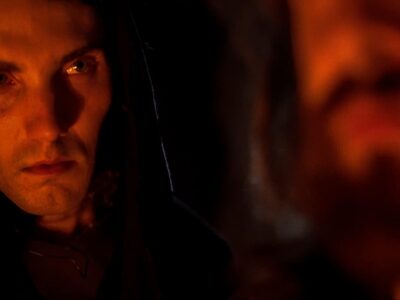Trektember: Mad Idolatry | The Orville
The Emissary from Above
I’ve always had a complicated relationship with science fiction when it tries to tackle religious subject matter. More often than not, the religious ideologies are minimized and dismissed as lunacy, while a fundamental belief in the power and eventual triumph of human logic inevitably prevails. The misfortune of this tendency is that science fiction may be one of the most fundamentally valuable genres through which to explore theological mysteries, given the limitless collection of both imaginative and factual elements which may be thrust into dialogue with one another.
The title of The Orville’s season 1 finale—“Mad Idolatry”—placed me immediately on the defensive when watching the episode. Seth MacFarlane is an outspoken atheist and I intuited that his perspective on a religious plotline would be understandably biased. However, the episode is surprisingly thoughtful and sensitively told, and while it still ultimately concludes that human logic and reasoning are paramount, there are fascinating elements to its narrative which skirt a glance towards a distant, more supernatural horizon.
While exploring a planet whose inhabitants are in their cultural Middle Ages, Commander Kelly Grayson stumbles upon a young child who has injured her head. Acting without considering the consequences, she heals the child and leaves, unaware that her presence has started a chain reaction which will lead to centuries of established religious thought on that planet. The planet phases into an alternate time stream wherein seven centuries pass in the equivalent of 11 days for The Orville. The crew then has less than a day to interact in real time with the planet’s natives, before it phases out again for another round of 700 years of development.
In each of these phases, the crew witnesses the rise of an entire dogma surrounding Kelly’s singular act of healing the child. Scriptures referred to as “the Word of Kelly” are used to control and manipulate the masses. Severe punishments are doled out for non-believers. Once, when Kelly approaches a high ranking religious official to clarify her own humanity and the spaceship’s existence, that religious leader is killed before he can reveal the truth so that the control the religion provides them is not abated. Where the episode fumbles is in its cheap shots at modern parallels of televangelists and mainstream media purveyors. The episode presents the stereotypes in typically reductive and outlandish form.
Yet, what causes this episode to stand apart from so many of its peers (and what makes it a compelling recommendation) is in its handling of Commander Grayson’s response to being made the center of a religious movement. Kelly is deeply remorseful, desperate to explain the missteps to the people before things progress any further, and even willing to sacrifice her own life to set things right. The crew speculates that if only a crew member could go and live among the people during one of their 700-year phases, perhaps they could steer the cultural development in the right direction. Unfortunately, this would mean certain death for whoever volunteered, and Kelly all but begs for the assignment.
In the end, it is Isaac, the endearing android for whom the passage of time is largely irrelevant, who accepts the responsibility and dwells among the planet’s inhabitants for an entire 700-year cycle. During that time, he guides them and reveals the truth of the Orville to them; eventually leading them to a place where they could proceed in their own understanding, building upon what they’d learned. I have no illusions that MacFarlane was intending a Christological parallel with this narrative (the script of which he penned personally), but it is worth considering the echoes of the Gospel in how the episode unfolds.
One thing of which all denominations of Christianity agree is that it is possible to misinterpret truth. Naturally, nearly all denominations believe that they understand the truth in the most proper and correct way, but the possibility of people misappropriating the scriptures for their own purposes is an indisputable possibility of the human condition. When this occurs on the planet, it could have easily been handled for laughs—the show is technically a comedy, after all—or as an opportunity for sermonizing against religious thought. Instead, Kelly deeply desires to set things right, and she is willing to sacrifice herself and her future to that end.
John 1:14 tells us that “The Word became flesh and made his dwelling among us.” In the same manner that the Orville crew knew the best possible hope for the people would be for one of them to go to the planet and linger among them, an essential element of the Gospel of Jesus Christ is the incarnation of Him who is the Word of God. Rather than continuing to dictate laws from above which no one could ever fully follow, “The Word became flesh and made His dwelling among us.”
There was insurmountably more to Christ’s work than merely steering a people in the right direction, but as an echo of a surprisingly sensitive and thoughtful exploration of such events, it impressed me that “Mad Idolatry” took the turns it did. By presenting Kelly as very personally invested in how the people were misappropriating what she had done and by landing the solution squarely on the shoulders of an emissary living among the people, the episode stumbles right up to the edge of recognizing how a benevolent God would desire to reconcile His people and would be willing to stop at nothing—including sacrificing Himself—to see them made whole.
• • •
Trektember is an annual series about Star Trek; this year, we’re examining the first seasons of Star Trek: Discovery and The Orville. For more information on this series, click here; or, to read every article from the beginning, click here!







